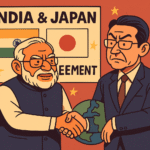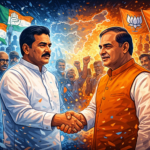Former RBI Governor Urjit Patel has been named India’s Executive Director at the IMF. Here’s why this move matters globally and locally.
Remember that one kid in school who was always good with numbers, kept the class disciplined, and then somehow ended up becoming head boy? Well, that’s Urjit Patel’s career trajectory—except the “school” is India’s financial system, and the “head boy” badge is now a seat at the International Monetary Fund (IMF). 🎓💼
From RBI to IMF—Urjit Patel is proving that calculators can indeed be passports to global power tables.
Patel’s Big Move
The Government of India has appointed former RBI Governor Urjit Patel as India’s representative to the executive board of the IMF. His term? Three years (or shorter, if the government decides to reshuffle).
This comes just four months after Krishnamurthy V Subramanian was removed as India’s Executive Director at the IMF—a move that raised eyebrows because his tenure still had six months left. Patel’s entry brings a mix of surprise, nostalgia, and expectation.
Why Patel?
Urjit Patel isn’t just any ex-banker. He is known for his tough stance on inflation, love for monetary discipline, and occasionally—awkward silences at press conferences. Remember demonetisation? Patel was at the RBI helm during those stormy days, trying to keep monetary policy steady while the entire country queued at ATMs.
He may have been criticized for not being very “vocal,” but globally, that reputation of being a quiet economist with sharp intellect might actually be India’s ace card at the IMF.
IMF: Why Should You Care?
Okay, let’s zoom out. The IMF Executive Director (ED) role isn’t just ceremonial. It’s India’s voice in shaping international lending policies, global financial stability plans, and sometimes, crisis bailouts for other nations. In short, if money makes the world go round, the IMF decides how fast it should spin.
India, being the world’s fifth-largest economy, needs someone credible at the table. Patel, with his central banking experience, ticks most of the boxes.
👉 Even the IMF’s official explainer on governance International Monetary Fund – Governance Overview shows how crucial ED roles are in balancing voices from emerging economies like India.
The Backstory Drama
Patel’s appointment, however, didn’t happen in a vacuum. His predecessor, Krishnamurthy V Subramanian, was removed suddenly in April—just months before his tenure ended. Such abrupt exits usually hint at behind-the-scenes policy differences.
While the government never disclosed details, Patel’s entry seems to signal a reset. Think of it like changing the DJ at a party because the earlier one was playing too many slow songs.
Why This Matters to India
- Global Credibility: Patel brings the RBI governor tag, which automatically earns respect in international finance circles.
- Policy Continuity: He understands India’s macroeconomic challenges—especially inflation, debt, and forex reserves.
- Diplomatic Leverage: In times of global crisis, India’s ED at IMF can influence bailout conditions for other countries. That’s soft power with hard cash.
Remember, India isn’t just a participant—it’s a shaper of the global financial order now.
What Critics Might Say
Patel’s critics often complain about his “communication gap.” As RBI governor, he wasn’t exactly the most chatty. Some say he avoided tough press questions. Others recall his sudden resignation in 2018, which sparked speculation of friction with the government.
But at the IMF, being a little reserved might be an advantage. After all, global finance is less about soundbites and more about negotiations. And Patel is known to hold his ground firmly, even under political heat.
Fun Analogy Time
Think of the IMF boardroom as a cricket field. Every country sends its best batsman to represent them. India has now sent Patel, who may not hit sixes like Virat Kohli, but can definitely anchor the innings with steady singles. Sometimes, that’s exactly what wins matches.
The Global Angle
Patel’s arrival comes at a time when the world is juggling inflation, currency instability, and geopolitical shocks. From the US Federal Reserve’s moves to China’s slowing economy, the IMF is dealing with multiple fires. Patel’s experience at the RBI—where he often had to manage both domestic inflation and global investor expectations—fits right into this environment.
He’ll likely focus on:
- Ensuring emerging markets like India get a louder voice
- Pushing back on policies that overly favour developed nations
- Advocating financial stability while balancing growth needs
The Patel Legacy at RBI
Let’s not forget—Patel was the man behind the inflation targeting framework. He also strengthened RBI’s independence in policy-making. While his tenure ended with a controversial resignation, economists often credit him with putting discipline back into India’s monetary policy.
And yes, he was Governor during the chaotic days of demonetisation. While critics argue the move’s economic benefits were unclear, Patel’s ability to manage policy amidst chaos adds a layer of crisis-handling experience.
Smiling Takeaway
So, what do we get? Urjit Patel may not be the loudest economist in the room, but sometimes, the quiet ones get the last word. And in the IMF’s big boardroom of global finance, India’s new ED could be exactly the calm, composed presence we need.
If money talks, Patel is India’s translator at the IMF—calm, precise, and with no unnecessary drama.
What do you think about Urjit Patel’s appointment? Will he bring India more influence at the IMF, or will it be just another quiet posting? Share your thoughts below, discuss with friends, and don’t forget to follow us for more witty takes on serious news.
Related Post Suggestion
“Rajiv Ranjan’s Big Move: From RBI to BRICS Bank VP & CRO”













